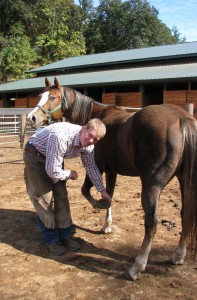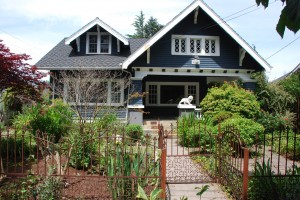One could almost say Mark Dietrich would rather be kicked in the head by a horse than hold down a desk job – almost.
Dietrich recently launched Foothills Farrier Service, shoeing horses all over the Willamette Valley.
For the 26-year-old, horseshoeing was an excellent way to combine his passions with his talents. He’s an outdoorsman who loves hunting and fishing and enjoys driving around the region visiting other farms and ranches.
“I love the ranching lifestyle. I’ve always enjoyed working with livestock; I’ve been around horses and cattle a lot in the farm and ranch jobs I’ve had,” Dietrich said. “I’m pretty good with my hands, too; this is a way to meld the two together.”
After a year of college, a job at a Minnesota cattle ranch “opened my eyes to the world of horses.”
He came home and started working with a couple of horses and soon found his way to Oregon Farrier School, based at Canyonview Camp and run by Beau Whiteaker. Though many students travel great distances to attend the school, for the Silverton resident the school couldn’t have been handier. The students’ hands-on training comes through caring for Canyonview’s 70-horse herd.
Dietrich is a graduate of Silverton High School whose older brother, Brian, a veterinarian, recently assumed ownership of Abiqua Animal Clinic.
Programs and clinics for those
seeking a horseshoeing career
as well as those desiring to shoe
and care for their own horses.
Licensed by the Oregon Department
of Education, OFS is located at
Canyonview Camp, Silverton.
503-901-7651 or
oregonfarrierschool.com
For hundreds of years, the term “farrier,” from the Latin word for iron, was synonymous with “blacksmith.” Over the past couple of centuries, development of the screw-cutting lathe, followed by the concept of interchangeable parts, spelled the beginning of the end for the village blacksmith. Most turned their focus primarily to horseshoeing – until the automobile sputtered onto the scene.
They still shoe horses, don’t they? Yes; and now “farrier” refers exclusively to one who cares for horses’ feet and creates and attaches their shoes. Farriers must know as much about the anatomy and physiology of the horse’s lower limb as about their set of blacksmith tools.
Though a matter of opinion to some degree, Dietrich said horses requiring shoes typically include those who tend to wear out their hooves faster than they can grow; performance horses, such as jumpers and racers, that need good traction; and those required to travel long distances or bear a heavy workload. Horseshoes can also be designed to correct a variety of maladies of the foot and leg.
Although some employ the “cold shoe” technique for horseshoeing, that’s not the way Dietrich was taught.
“You can shape (hot) shoes a lot easier. Hot-setting the shoe makes it fit better, kills bacteria in the foot and you have to have fire in order to build custom shoes, such as for a lameness issue,” Dietrich said. The forge he travels with is powered by propane.
“Propane’s a lot handier than coal, though you can get a shoe hotter with coal,” Dietrich said. “But it makes a real mess in your rig – and with propane, you can fill up at any gas station.”
Nevertheless, he plies his art using time-proven tools that conjure up the sights and sounds of an earlier time. Dietrich loves the history of horses and cowboy lore.
“The horse was very instrumental in developing this country,” he said. “Many horses were used in the early wars.”
Dietrich said his family was surprised at his chosen field.
“It kind of blows people away when they find out what I do; many don’t realize people are still shoeing horses,” Dietrich said. “Hands-on, niche-type work is kind of a dying breed. I’m really enjoying what I do.”
Dietrich also serves as an instructor at the farrier school, helping teach the next generation of horseshoers.
“We go beyond just getting a piece of steel on a horse’s hoof,” Dietrich said. “We really push good horsemanship, honesty, reliability and professionalism. I won’t put shoes on a horse that doesn’t need them.”

